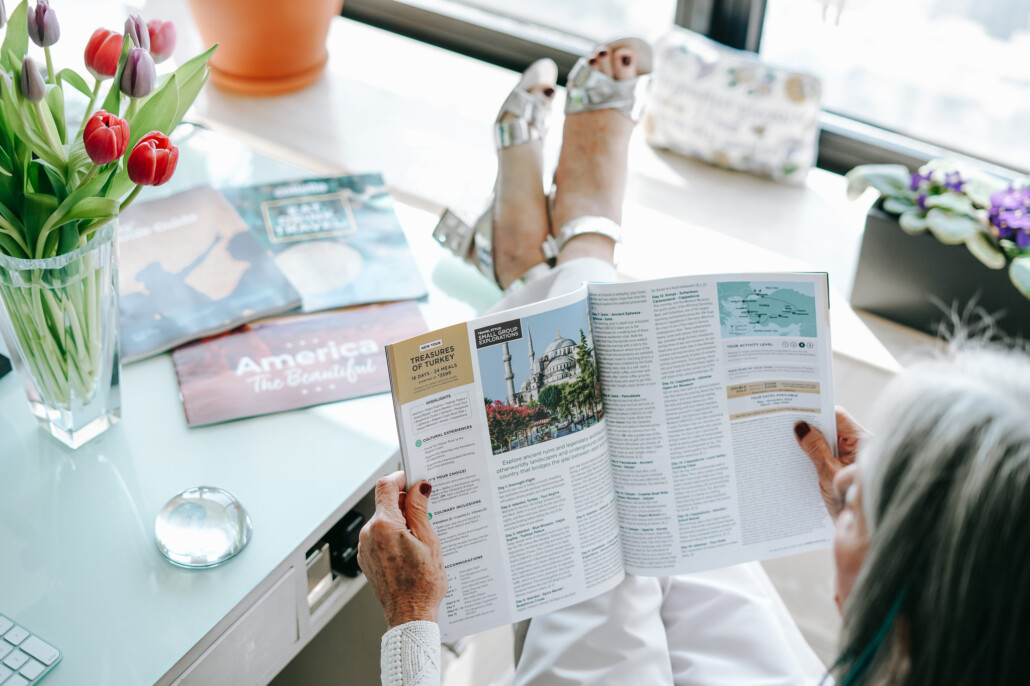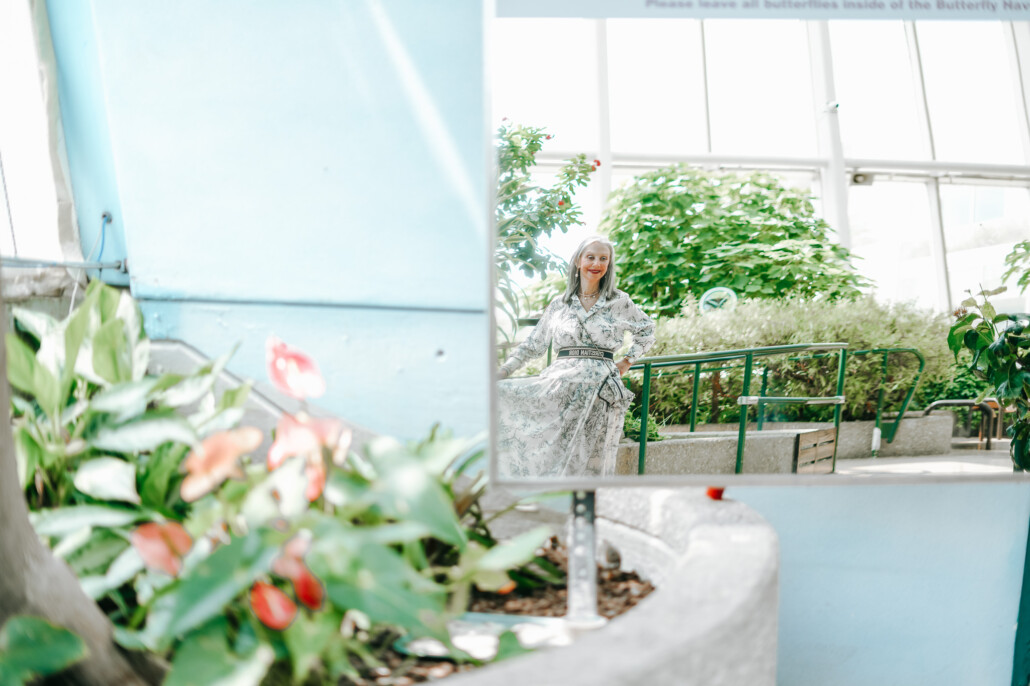Today’s post was written by insightful Ann Richardson, who is a frequent and popular contributor to international sites, as well as the author of the book, The Granny Who Stands on Her Head: Reflections of growing older. Enjoy, darlings!

I am personally of the view that when we pop out of the womb, we already have not only those delightful little fingers and toes but also a huge amount of our personality-to-be.
The problem is that – unlike easy physical characteristics – personality traits are not immediately visible. Parents and others have to figure them out as they emerge over the course of time. The development of our personality, much like aging, is a natural part of life that unfolds as we grow.
Some of us are forthright and demanding, some shy and more eager to please. Some of us love to be around other people and interact with them. Some prefer time on our own.
I could go on and on.
I suspect any readers who are mothers will recognize the process of working it all out. And, especially when they have more than one child, they will recognize the surprise in the huge differences that slowly unfurl.
BUT – wouldn’t it be nice if we could emerge with heaps of self-confidence as well?
As we grew into little girls, we would be happy and assertive of our wants – indeed, ready to tell everyone around us just what we think should be done on any particular occasion. We would genuinely like ourselves and feel that we are – if not really pretty – pretty enough. And whatever captured our interest would feel like a reasonable pre-occupation. These early experiences and the messages we receive from others shape our feelings about ourselves, influencing how we view our worth and abilities.
And then we would grow up into happy and confident adult women (we might pass over the adolescent stage here). We would know all along who we are, what we want and how to set in train the process of getting it. We would look at ourselves and feel pleased. Yes, of course there are flaws here and there, we might think, but overall, we are ready to take on the world.
Fat chance. The world is nothing like that.
Well, to be fair, there are occasional people like that. My son was full of confidence as soon as he could talk. To my utter astonishment, even as a toddler, he treated everyone around him like an equal, which didn’t go down well at nursery – or any later – school. I never taught him to do that – he just did it. I have no idea where it came from. If it’s genetic, it didn’t come from me. But I do notice that his son is quite similar.
Women, Confidence, and Self Esteem
In practice, we all know that a lack of confidence seems to start very early on, abetted perhaps by what we are told. A great number of little girls – if not the great majority – feel that something is not quite right about themselves. Our hair is the wrong colour, our nose is too big, we are too fat or too skinny.
And people tell us that we are ‘too clever for our own good’ or ‘turning into a right tomboy’ or some other jocular put-down. We readily absorb such messages and wonder why we don’t fit into the world around us. Over time, these negative messages can have a significant impact on our emotional well being.
As we grow into women, we find ourselves with much the same response. We aim to be physically attractive but are certain that our bum is too big or our breasts are too small. Our hair isn’t right.
We aim to achieve in our chosen profession, but we are told that we are ‘too mousey’ or ‘too ambitious’ or even ‘not ambitious enough’. When we become mothers, we are ‘not paying enough attention to the children’ or, perhaps, ‘over-coddling them’. So many ways to be in the wrong.
Whatever direction we happen to take, more often or not, we believe it was not the right one. Even when we are successful in our careers, we develop what has come to be called ‘imposter syndrome’ and wonder when anyone is going to find us out. Developing high self esteem can help counteract these doubts and foster greater confidence in our abilities.
This is, you may think, an exaggeration, but I believe it speaks for a lot of women.
The Good News
Well, there is good news at the end of the rainbow. Whatever you may be feeling in your twenties, thirties and forties, the horizon begins to change somewhere in your fifties. Learning to embrace aging leads to greater confidence and a more positive outlook on life. And this grows even more in your sixties, seventies and right on up.
I speak as a woman in her early 80s and I have been there.
You slowly realize – and I mean deeply realize – that you are not so bad after all. You know that there are places and moments where you have shined, whether at work or in the home, and you feel rightly pleased with yourself. Yes, you can do well.
You begin to accept praise as your due and stop looking quite so diligently for that voice deep inside who will tell you it was all a fluke. Indeed, that voice will often disappear altogether.
Moreover, you will find that there are other areas – differing with your personality or circumstances – where it just doesn’t matter anymore. Yes, your bum is big, but so what? There are ways of dealing with it. It’s part of the package of who and what you are.
Yes, you are (or were) ambitious, but that is a good thing and enabled you to flourish. Yes, you made mistakes, but doesn’t everybody?
You are no longer embarrassed by who you are. Embracing aging with dignity and self-care allows you to appreciate your journey and accept yourself fully. And, as one woman said to me recently, talking about why she liked being old, “You just don’t care anymore.” Old age becomes a time of increased self-acceptance and freedom from external judgments.
All of these experiences and realizations contribute to a life well lived, where embracing aging brings fulfillment and meaning.
The Importance of Liking Yourself and a Positive Mindset

Confidence is all important. It is that thing that enables us to carry out our day-to-day tasks happily and well. Confidence can significantly impact one’s ability to enjoy life, influencing how we approach challenges and opportunities. It is the thing that drives us on to do well – whether as supportive wives and mothers or as active contributors in the company boardroom.
It also represents a new form of freedom. The freedom to say no, you won’t accompany your husband to endless crime films, even to keep him company. He may like them, but you don’t – and you would prefer to stay home. Or medieval music. Whatever.
It’s up to you – and you know it and he knows it. And if he really loves you, he will welcome the development, even if it is sometimes annoying on a day-to-day basis. Having a supportive environment in your relationships can foster this confidence, making it easier to express your true preferences and feel secure in your choices.
Physical Health and Wellness
Let’s talk about the foundation of aging with confidence: physical health and wellness. It’s no secret that our bodies change as we age, but that doesn’t mean we can’t feel strong, vibrant, and self-assured. In fact, taking care of our physical health can significantly boost our self-confidence and overall well-being.
A balanced diet rich in colorful fruits, crisp vegetables, and hearty whole grains does wonders for our bodies—and our minds. These foods help maintain physical health, support cognitive function, and keep our energy levels up so we can continue to do the things we love. And let’s not forget the importance of staying hydrated; a simple glass of water can be a small act of self-care that pays big dividends.
Regular physical activity, whether it’s a brisk walk in the park, a gentle yoga class, or even dancing around the living room, plays a significant role in helping us maintain independence and age gracefully. Moving our bodies not only keeps us physically fit but also gives us a sense of accomplishment and confidence.
By approaching physical health with a positive attitude, we remind ourselves that we’re worth the effort. Prioritizing our well-being isn’t just about avoiding health issues—it’s about embracing the aging process with vitality and joy. So, let’s celebrate our bodies, nurture them with care, and continue to age with confidence, one step (or headstand!) at a time.
Mindfulness and Aging
Aging with confidence isn’t just about what we do with our bodies—it’s also about how we nurture our minds and hearts. Mindfulness is a gentle yet powerful tool that helps us stay present, savor life’s moments, and cultivate a positive mindset.
Practicing mindfulness can be as simple as taking a few deep breaths, enjoying a quiet cup of tea, or pausing to appreciate the beauty around us. These small acts help reduce stress and anxiety, which can weigh heavily on our mental health. By being present, we give ourselves the gift of self-acceptance and self-love, allowing our self-esteem to flourish.
Mindfulness also keeps our minds active and sharp, supporting cognitive health and helping us stay focused as we navigate new experiences. It encourages us to embrace each day with a sense of curiosity and confidence, knowing that we are capable of handling whatever comes our way.
As we age, mindfulness can lead to a more fulfilling life by helping us let go of negative stereotypes and embrace the unique journey we’re on. So, let’s take a moment to breathe, reflect, and celebrate ourselves—because confidence begins with being kind to our own minds.
Social Connections and Aging
No one is an island, especially when it comes to aging with confidence. Social connections are the heart and soul of a fulfilling life, providing us with emotional support, laughter, and a sense of belonging.
Staying socially active—whether through community groups, volunteering, or simply spending time with family members and friends—can significantly boost our mental health and self-assurance. These relationships help us feel connected, valued, and understood, especially during times of change or challenge.
Nurturing social relationships also opens the door to continuous learning and new challenges. Maybe it’s joining a book club, trying a new hobby, or attending community activities. Each new interaction is an opportunity to grow, share, and develop a positive outlook on life.
Let’s not underestimate the power of a friendly chat, a shared meal, or a heartfelt laugh. These moments of connection are essential for our overall well-being and confidence. So, reach out, stay engaged, and remember: the more we nurture our social connections, the more we thrive—together.
Finding Purpose and Meaning
As we journey through the aging process, finding purpose and meaning becomes a guiding light that helps us navigate life’s changes with confidence and grace. Whether it’s adjusting to retirement, exploring new interests, or coping with the loss of a loved one, discovering what gives our lives meaning is essential for our overall well-being.
Purpose can take many forms—lifelong learning, picking up a new hobby, volunteering, or embracing new challenges. Each step we take towards something that excites or inspires us helps us maintain a sense of direction and self-worth. It’s worth noting that what brings purpose and meaning to one person may be entirely different for another, and that’s the beauty of it.
By staying engaged and open to new experiences, we foster a positive attitude toward aging and significantly boost our confidence. Embracing this process allows us to live a fulfilling life, rich with opportunities for growth, joy, and connection.
So, let’s celebrate our unique talents, explore new paths, and remember that it’s never too late to find new meaning. Aging with confidence means honoring our past, embracing the present, and looking forward to the adventures still to come.
The Choice is Yours
You have the freedom to wear your pyjamas all day, if that’s what you want. Or miniskirts, whether they suit you or not. Or big hats. Whatever you feel like wearing to express what it feels like to be you. Yes, there may be occasional gossip, but who cares?
You can take up new interests of your own. It might be paragliding. Or bible studies. Or the violin. Maintaining cognitive abilities and learning new skills, such as a new language, are important for keeping your mind active and mind sharp as you age.
Regular exercise and staying active help older adults adapt to physical changes and support overall health. Regular check ups are also essential for preventing memory loss and supporting cognitive abilities.
Nurture relationships with loved ones, as strong social connections provide emotional support and boost well-being. Public health initiatives play a key role in supporting healthy aging for everyone.
So, what did I do? I started yoga at the age of 50 and learned to stand on my head. I still do. And I took up choir singing in my early 50s. I am still loving it.
And having written reports from research undertaken for various agencies all my life, I decided to write narrative books on subjects of interest to me. Including the one on being old, called The Granny Who Stands on her Head
I don’t know why it takes fifty or more years to gain a belief in ourselves, but it does seem to.
It may annoy you that you didn’t make all these decisions a long time ago, but feel happy that you make them now.
Go for it.
 Ann Richardson’s most recent book, The Granny Who Stands on Her Head, comprises a series of reflections on growing older (including why she likes being there) and is partly a memoir. Information on her other books can be found on her website (www.annrichardson.co.uk). Do subscribe to her free Substack newsletter, with articles on any subject that captures her imagination. (https://arichardson.substack.com/)
Ann Richardson’s most recent book, The Granny Who Stands on Her Head, comprises a series of reflections on growing older (including why she likes being there) and is partly a memoir. Information on her other books can be found on her website (www.annrichardson.co.uk). Do subscribe to her free Substack newsletter, with articles on any subject that captures her imagination. (https://arichardson.substack.com/)
Ann lives with her husband of sixty years in London, England.
If you enjoyed this story, please subscribe to my email list. I’ll share my stories and exclusive content with you. You might also enjoy my post: What I Love and Deplore About Aging.

+ show Comments
- Hide Comments
add a comment